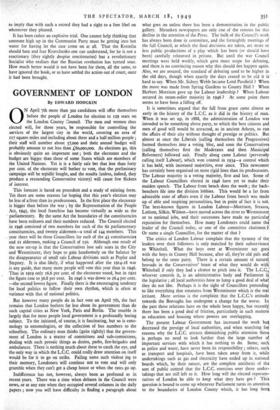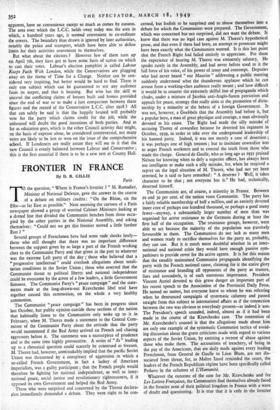GOVERNMENT OF LONDON
By EDWARD HODGKIN
ON April 7th more than 300 candidates will offer themselves before the people of London for election to 129 seats on the London County Council. The men and women thus elected will, for three years, be responsible for controlling the sea-vices of the largest city in the world, covering an area of 117 square miles and including about three and a half million people ; their staff will number about 57,000 and their annual budget will probably amount to not less than k6o,000,000. As elections go, this is obviously quite an important one ; both the electorate and the budget are bigger than those of some States which are members of the United Nations. Yet it is a fairly safe bet that less than forty per cent. of the electorate will bother to vote, that the preliminary campaign will be tepidly-fought, and the results (unless, indeed, they produce a resounding Conservative victory) will cause few flickers of interest.
This forecast is based on precedent and a study of existing form. Yet there are some reasons for hoping that this year's election may be less of a frost than its predecessors. In the first place the electorate is bigger than before the war ; by the Representation of the People Act, 1945, the local franchise has become virtually as wide as the parliamentary. By the same Act the boundaries of the constituencies have been redrawn and their numbers reduced. The Council elected in 1946 consisted of two members for each of the 62 parliamentary constituencies, and twenty aldermen—a total of 144 members. This year there will be three Councillors for each of the 43 constituencies and 21 aldermen, making a Council of 15o. Although one result of the new set-up is that the Conservatives lose safe seats in the City and Westminster, they hope to gain handsomely on the balance by the disappearance of small safe Labour divisions such as Poplar and Stepney. It is also likely, if what happened after the 1914-18 war is any guide, that many more people will vote this year than in 1946. Thus in 1919 only 16.6 per cent. of the electorate voted, but in 1922 the figure rose to 36.8 per cent. In 1946 it was down to 26.4 per cent. —the second lowest figure. Finally there is the encouraging tendency for local politics to follow their own rhythm, which is often at variance with that of national politics.
But however many people do in fact vote on April 7th, the fact remains that London bothers far less about its government than do such capital cities as New York, Paris and Berlin. The trouble is largely that for most people local government is a profoundly boring subject. To the initiated, of course, it is fascinating, but so is ento- mology to entomologists, or the collection of bus numbers to the schoolboy. The ordinary man thinks (quite rightly) that the govern- ment of London is a matter of committees and sub-committees, dealing with such prosaic things as drains, parks, fire-brigades and ambulances. There is nothing much about these to catch the eye, and the only way in which the L.C.C. could really draw attention on itself would be for it to go on strike. Failing some such violent jog to their memory, Londoners will continue not to vote and will only grumble when they can't get a cheap house or when the rates go up.
Indifference has not, however, always been as profound as in recent years. There was a time when debates in the Council were news, or at any rate when they occupied several columns in the daily papers ; now you will have difficulty in finding a paragraph about what goes on unless there has been a demonstration in the public gallery. Shrunken newspapers are only one of the reasons for this decline in the attention of the Press. The bulk of the Council's work has always been done in committee, and the fortnightly meetings of the full Council, at which the final decisions are taken, are more or less public productions of a play which has been (or shou!cl have been) carefully rehearsed in private. But until the war Council meetings were held weekly, which gave more scope for debating, and there is no convincing reason why this should riot happen again. Also, we are assured, the standard of debating used to be higher in the old days, though when exactly the days ceased to be old it is' hard to say. When Mr. Sidney Webb became Lord Passfield ? When the move was made from Spring Gardens to County Hall ? When Herbert Morrison gave up the Labour leadership ? When Labour secured its steam-roller majority in 1946 ? At some point there seems to have been a falling off.
It is sometimes argued that the fall from grace came almost as early in the history of the L.C.C. as it did in the history of man. When it was set up, in 1888, the administration of London was intended to be something above party, to which the best citizens and men of good will would be attracted, as in ancient Athens, to run the affairs of their city without thought of prestige or politics. But almost at once the Liberals (calling themselves the Progressives) formed themselves into a voting bloc, and soon the Conservatives (calling themselves first the Moderates and then Municipal Reformers) followed suit. Finally along came Labour (perversely calling itself Labour), which won control in 1934—a control which it has held, with increased majorities, ever since. This newcomer has certainly been organised on more rigid lines than its predecessors. The Labour majority is a voting majority, first and last. Some of the Labour Councillors elected in 1946 have yet to make their maiden speech. The Labour front bench does the work ; the back- benchers file into the division lobbies. This would be a far from admirable state of affairs even if the Labour front bench was made up of able and inspiring personalities, but in point of fact it is not. The best-known figures in London Labour—Morrison, Strauss; Latham, Silkin, Wilmot—have moved across the river to Westminster or to national jobs, and their successors have made no particulai reputation for themselves. How many Londoners could name tho, leader of the Council today, or one of the committee chairmen ?, Or name a single Councillor, for the matter of that ?
The critics of London Labour complain that the tyranny of the, leaders over their followers is only matched by their subservience to Whitehall. What the boys over at Westminster say goes' with the boys in County Hall because, after all, they're old pals and belong to the same party. There is a certain amount of natural, bravado in the Conservatives' boast of what they would do with' Whitehall if only they had a chance to pitch into it. The L.C.C.;1 whoever controls it, is an administrative body and Parliament Ise the legislative ; all local authorities have to lump a good deal of what they do not like. Perhaps it is the sight of Councillors pretending to like everything that emanates from Westminster which is the real irritant. More serious is the complaint that the L.C.C.'s attitude towards the Boroughs has undergone a change for the worse. In the past these relations have on the whole been happy, but recent15■1 there has been a good deal of friction, particularly in such matters as education and housing where powers are overlapping.
The present Labour Government has increased the work bull decreased the prestige of local authorities, and when searching for, reasons why the L.C.C. attracts diminishing public attention there is perhaps no need to look further than the large number of important services with which it has nothing to do. Some, such as police and water, have never been its responsibility ; others, such as transport and hospitals, have been taken away from it, while undertakings such as gas and electricity have ended up in national boards which, by their nature, are the complete antithesis of the sort of public control that the L.C.C. exercises over those under- takings that are still left to it. How long will the elected represen- tatives of London be able to keep what they have got ? This question is bound to come up whenever Parliament turns its attention to the boundaries of London County which, it has long beeq
apparent, have no convenience except so much as comes by custom. The area over which the L.C.C. holds sway today was the area in which, a hundred years ago, it seemed convenient to co-ordinate the sewers. The boundary thus drawn is ignored by later authorities, notably the police and transport, which have been able to define limits for their activities convenient to themselves.
But what about the electors ? However few of them turn up on April 7th, they have got to have some basis of action on which to cast their votes. Labour's election pamphlet is called Labour Keeps Faith With London, while the Conservatives are plugging away on the theme of Time for a Change. Neither can be con- sidered very inspiring, but better would be hard to find. There is only one subject which can be guaranteed to stir any audience from its torpor, and that is housing. But who has the skill to unravel the conflicting claims of houses built and homes provided since the end of war or to make a just comparison between these figures and the record of the Conservative L.C.C. after 1918 ? All that can safely be said is that the happily housed will probably vote for the party which claims credit for the job, while the unhoused will doubt the good intentions of both parties. And as far as education goes, which is the other Council activity that might, on the basis of expense alone, be considered controversial, not many votes are likely to be lost or won on the issue of the comprehensive school. If Londoners are really astute they will see to it that the new Council is evenly balanced between Labour and Conservative ; this is the first essential if there is to be a new zest at County Hall.







































 Previous page
Previous page